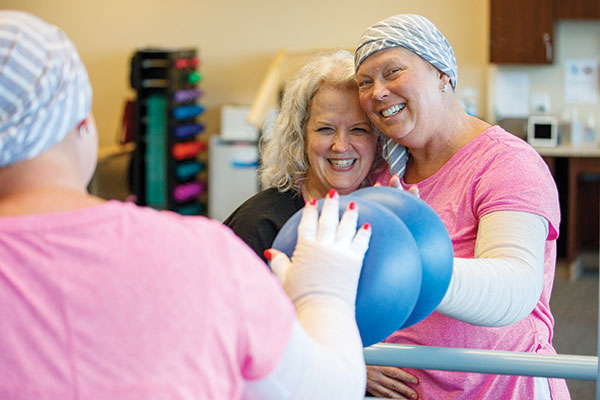How Cancer Rehabilitation Can Help You Live Well
by Michael D. Stubblefield, MD
Though we have made extraordinary gains in our ability to treat and even cure cancer, half of the 17 million cancer survivors in the U.S. will experience long-term issues as a result of their disease – or, more often, its treatment. The cure for cancer often comes at a high cost that many cancer survivors will pay for the rest of their lives.
Chronic fatigue, pain, mobility issues, difficulty with everyday tasks, and cognitive dysfunction are just a few of the countless costs associated with cancer. These issues can severely affect a cancer survivor’s quality of life. And, unfortunately, many of these problems will not “just go away” on their own. To live your best life as a cancer survivor, you may need cancer rehabilitation.
What Is Cancer Rehabilitation?
Cancer rehabilitation is the process of restoring cancer survivors to the highest possible level of function and quality of life. Just as there are many types of oncologists, there are multiple types of cancer rehabilitation professionals. No one cancer rehabilitation clinician will have all the knowledge, skill, and experience that every person needs. The key members of a comprehensive cancer rehabilitation team include specially trained physicians, physical therapists, occupational therapists, and speech language pathologists, among others.
Cancer rehabilitation physicians (also known as physiatrists) are doctors who specialize in cancer rehabilitation. They can help get to the root of what is causing the problems a cancer survivor is experiencing, as well as prescribe medications, order therapy, perform injections, and offer other treatments to aid recovery. To provide safe and effective care, cancer rehabilitation physicians must understand not only cancer and its treatment but also how additional medical problems, such as arthritis, heart disease, or diabetes, can affect rehabilitation efforts.
Cancer rehabilitation is the process of restoring cancer survivors to the highest possible level of function and quality of life.
Physical therapists can help reduce pain and restore mobility for cancer survivors by developing and monitoring therapeutic exercise programs designed to improve strength, endurance, flexibility, coordination, and overall mobility.
Occupational therapists can help cancer survivors become better able to perform activities of daily living by using therapeutic activities and adaptive strategies. Some may even help cancer survivors manage cognitive issues like poor memory and inability to concentrate.
Speech-language pathologists are specialists who evaluate and treat speech and swallowing disorders that many cancer survivors experience. They can perform specialized swallowing studies and teach exercises to help improve speech and swallowing. Like occupational therapists, some speech-language pathologists also help cancer survivors manage cognitive issues.
Finding the Right Fit
Finding the right cancer rehabilitation services can be challenging for many survivors. Some may not even realize that cancer rehabilitation can help them. Others may not have access to the services they need nearby.
The first step to cancer rehabilitation is discussing your functional issues with your oncology team. Your doctors may already have a network of rehabilitation specialists they can refer you to. Most medical centers will have outpatient therapy services to treat common disorders like peripheral neuropathy and shoulder dysfunction. Some can also treat the lymphedema that can occur with breast cancer and some other cancers. Such services may not be specific to cancer survivors but should be helpful for those who have minimal and uncomplicated problems.
People with more severe, multiple, or complex issues may be better served by seeing a cancer rehabilitation physician. These physicians are more likely to have the skill and experience needed to perform a comprehensive evaluation and devise a safe and effective treatment strategy. Unfortunately, there are not nearly as many cancer rehabilitation physicians as there are other rehabilitation specialists, like physical therapists. An internet search may help you find one near you. If there are no cancer rehabilitation physicians in your community, you may want to consider telehealth.
Though there is no substitute for a face-to-face clinical visit where you can be examined in detail, telemedicine can help connect you with a cancer rehabilitation physician if there isn’t one in your area.
One of the few good things to emerge from the COVID-19 pandemic is the rise of telehealth – the ability to be evaluated by a medical specialist virtually, using the camera and microphone on your smartphone or computer. Though there is no substitute for a face-to-face clinical visit where you can be examined in detail, telemedicine can help connect you with a cancer rehabilitation physician if there isn’t one in your area. Cancer rehabilitation physicians can often coordinate care at a distance and refer you to other clinicians nearby who can aid in the cancer rehabilitation process. Moreover, telemedicine may allow you to connect with these other types of therapists, even if there are none practicing in your local community.
If you are a cancer survivor who is still burdened by the side effects of your cancer or its treatment, you must advocate for yourself and make sure you get the cancer rehabilitation you need. Getting the right kind of help will give you the best chance of living well after cancer.

Dr. Michael Stubblefield is the medical director of Cancer Rehabilitation at the Kessler Institute for Rehabilitation in northern New Jersey. In addition, for the past several years, he has served as the national medical director of Cancer Rehabilitation for Select Medical, with a singular mission to develop an integrated national cancer rehabilitation program. Known as ReVital, this program has provided extensive and ongoing training in cancer rehabilitation to clinicians offering cancer rehabilitation services at more than 400 locations in 17 states.
This article was published in Coping® with Cancer magazine, May/June 2020.


